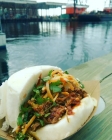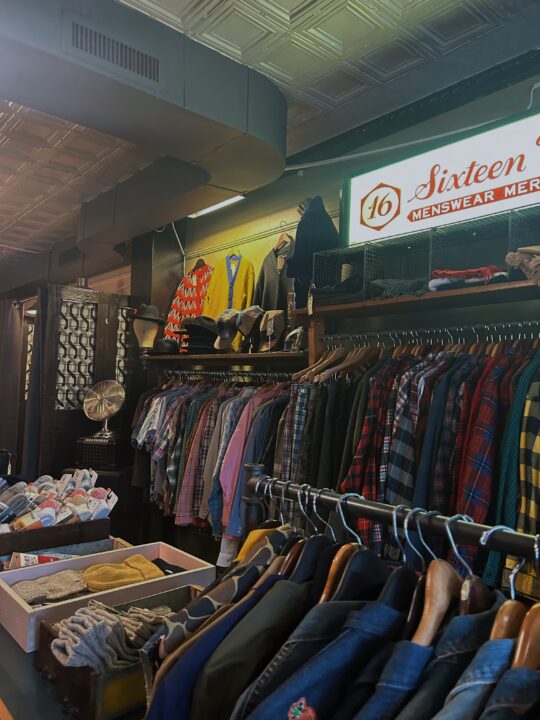It was Saturday morning at the Fell’s Point Market, and I was eating Thai chicken meatballs over rice with mango-papaya slaw. The source of this unique dish is Ekiben, an Asian-fusion food stand. It is soon to be a full-fledged restaurant come January. It was founded and is run by three UMBC alumni, Steve Chu, Ephrem Abebe and Nikhil Yesupriya. I had the pleasure of sitting down and eating with Nikhil, who talked about his key to success, gave advice for aspiring entrepreneurs at UMBC and outlined plans to grow Ekiben.
What did you major in at UMBC and how did your UMBC experience lead you to start a food stand?
I majored in biology, Steve majored in finance and Ephrem majored in IT. We really didn’t anticipate [taking] this route in college. It was just one of those things where we liked to cook, and we were very open to other cultures and things. We made a habit of going to all of the cultural events [at] UMBC because you’re never going to get that chance again. We always tried out the food there.
What in spired you to prepare, serve and sell Asian fusion food?
spired you to prepare, serve and sell Asian fusion food?
We got to a point where we were versed enough in these different cultural dishes [that] we were able to bring them together to make new things. It was us knowing the different cultural foods and experimenting with them. It also seems to be the way the food market is going. People are into different things now and that’s something we [offer] with our food.
Where did you get the name Ekiben?
Ekiben is a Japanese lunchbox. Traditionally, they’re served on trains in Japan with food in different sections. Our food is not Japanese but the name caught on pretty quickly. Honestly, one day Steve just called me and said “The name is Ekiben.” People seemed to like it.
How do you view what you are doing here? Is it a cut and dry business you want to profit from, is it just a hobby, or something else entirely?
I view the business as an opportunity to share with other people. Our food is quality food. If we were doing this purely for profit, we would cut down on costs a lot more. To me, food is an art and an expression of us. We do it for fun. We tried the food out to see if people would appreciate it, and they did. For me, it’s more of an opportunity to share [the expression of cultures] with Fell’s Point, to share with Baltimore.
What do newcomers usually think about the unique food that you serve?
For new people, we usually give out samples like our Thai chicken meatballs – something they’re familiar with, and [see if] they like them. Then, they ask about our buns and rice bowls. A lot of them usually have to be convinced, but it only takes a couple [of] bites to convince them. People who come here usually want a really unique experience where they can try something they’ve never had before.
something they’ve never had before.
What do you think about UMBC recently beginning to offer an entrepreneurship major?
I think [it’s] really great and it’s something that I would have done. You can use entrepreneurship for anything whether you’re a biologist, chemist or you want to go into food. It’s definitely something I think UMBC should focus on more because I know UMBC is a school that is really community-focused and there are programs where they want students to have experiences like this. You have a lot of open-minded students that really want to do a lot of good work, and a good way of [showcasing] that is getting them to understand business and economics. There is a huge need for STEM people in the private sector. Having your own business [means] you have control over your future, and your business becomes an expression of yourself. It’s a very different life than being in academia or doing research under someone else. I wish UMBC did more to strengthen the business culture.
What do you have to say to any UMBC students that may want to start their own business?
Every business is different, but I know of some things I am glad I did at UMBC that helped me with business. I know I got the most out of the diversity and openness of people at UMBC. I went to all the cultural events and tried to make the most of the opportunities there. Make connections – not just concerning academia, but concerning people from different cultures because, once you leave college, you’re not going to have those same opportunities and experiences. Also, be open to change –everything changed for us. When an opportunity came, we jumped at it, but we were very open. We trusted each other and we were okay with doing something new.
What is one thing you wish you knew going into starting your own business?
Probably how much work it takes. It’s not just working the cash register. [You have to] know the inventory and the numbers. It made me realize that not everyone is cut out to be a businessman. I know I’m not, but luckily Steve and Ephrem are. It takes a lot of attention to detail and a lot of work, and it wasn’t something I was totally prepared for.


